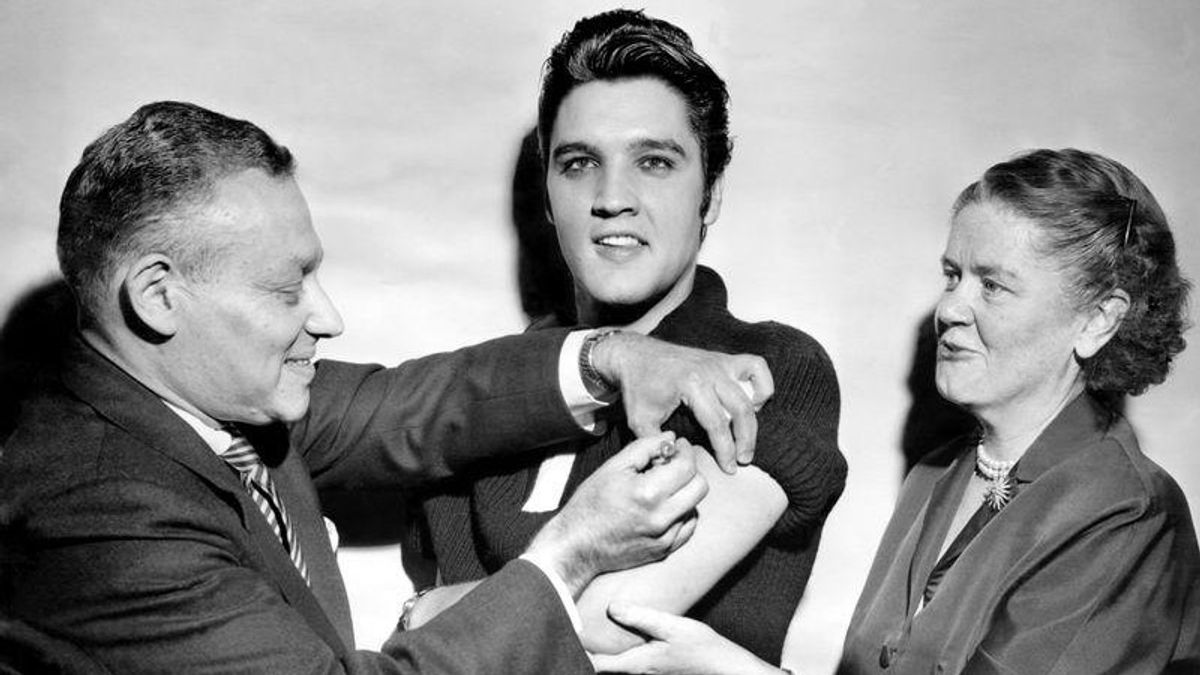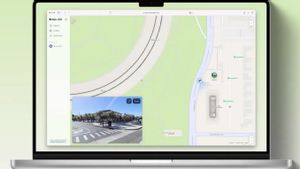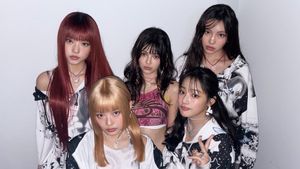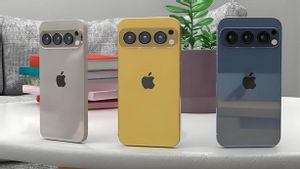JAKARTA - Celebrity who is also a businessman, Raffi Ahmad, is part of the earliest wave of recipients of China's COVID-19 vaccine, Sinovac, with President Joko Widodo (Jokowi). The authorities said Raffi represented the younger generation. Social media is busy asking why Raffi was chosen to represent the younger generation as well. The story of Elvis Presley being vaccinated against polio might illustrate why this is an important influence.
Spokesperson for Handling COVID-19, Doctor Reisa Broto Asmoro said Raffi was chosen because of his influence. The authorities believe Raffi is able to inspire the public, especially the younger generation, to comply with the COVID-19 vaccination program.
"Raffi Ahmad is here as a representative of millennials so that he can be an inspiration to believe in vaccines and contribute to the success of vaccination in Indonesia," said Reisa, Wednesday, January 13.
Raffi, after being injected with the vaccine, he immediately played a role. He shared an experience he had just experienced. According to Raffi, the vaccinations he was undergoing went well. Raffi admitted that he didn't feel anything, except for the reaction of the injection needle in his skin.
He also explained that health authorities closely monitor the reaction after injection for 30 minutes. The founder of Rans Entertainment said he was happy to be invited to a vaccine with Jokowi. Apart from Raffi, a number of other figures were also involved in the vaccine injection ceremony.

They include Doctor Daeng M. Fakih, Chairman of the IDI; MUI Secretary General Doctor Amiesyah Tambunan. For Raffi, he has even started his function of influencing from reaching the Palace. Raffi, on his social media, uploaded a photo of an invitation from the Palace. The invitation was also filled with a number of regulations before attending, such as including the latest PCR swab results. In the photo Raffi is also wearing a three-layer cloth mask plus a face shield.
Raffi's role in inspiring the true people was immediately carried out since he arrived at the Presidential Palace, Jakarta. Raffi uploaded an invitation photo which was also filled with a number of regulations before attending. Raffi Ahmad also showed a blue card that read "First Vaccination for COVID-19 at the Presidential Palace, January 13, 2021.
Elvis as influenceActually this logic is not very difficult to digest. But for those who seem completely confused by the government's move to invite Raffi to vaccinate with Jokowi, we can learn from the story of Elvis Presley in the midst of the polio outbreak.
At that time, in the 1940's, the polio epidemic broke out. On average each year the epidemic paralyzes more than 35 thousand people. In 1952, this plague infected 60 thousand people and killed three thousand of them.
In 1955, parents began injecting their children with the newly introduced Jonas Salk vaccine. The problem is the demographic group of adolescents and young adults. They are reluctant to get injections.
October 28, 1956, Elvis was scheduled to appear on The Ed Sullivan Show. It was Elvis's second appearance on the variety show. Before going on stage, Elvis poses for the press where he receives a shot of polio vaccine.
Hundreds of newspapers across the country recorded this historic event and published reports nationwide. Elvis looked determined. He smiled while taking a picture with a doctor.

Reporting from Smithsonia Magazine, health officials deliberately recruited Elvis, whose fame was skyrocketing that year, with hip movements, rock n roll hums and good looks. Elvis is an idol, especially for American teenagers.
"She's set a good role model for the country's youth," said New York City's health commissioner, Leona Baumgartner.
The New York Times reported that one day after Elvis's appearance on television, only 10 percent of New York City teenagers were vaccinated. In fact, after children, teenagers are the group most vulnerable to polio.
Between 1955 and 1957, polio cases were reported to have fallen in the United States. The percentage of reduction reached 81 percent, from 28,985 to 5,485. Elvis' pre-show inoculation was considered influential.
Stephen Mawdsley, an expert on modern American history from the University of Bristol, said, "Elvis is definitely helping teens make vaccine decisions."
Even so, Mawdsley explained, Elvis might wake up vaccine awareness, but the spread of the vaccination movement could be caused by the teenagers themselves. The National Foundation for Infantile Paralysis (NFIP), which later changed its name to the March of Dimes, said that at that time some youths formed a group called Teens Against Polio (TAP).
Youth movementTeens Against Polio (TAP) and other vaccination mobilization efforts faced major obstacles at that time. Researchers, Agnes Arnold-Forster and Caitjan Gainty, one of the obstacles to vaccination at that time was cost.
Imagine, at that time everyone had to get three shots of the vaccine to achieve immunity. Each of these vaccinations costs at least US $ 3 to 5 - about US $ 30-50 in addition to today's exchange rate.
For families with large numbers of children, the expenses are so heavy. Many parents are starting to run short of money and can only choose one or two injections. Of course this is in vain, because polio immunity can only be achieved with three injections.
Teenagers raise different problems. Many of them view polio as a childhood disease. Adding to this was the 1955 mowing incident.

At that time, a failed vaccine caused 40,000 cases of polio. Of those affected, about two hundred suffered from some degree of paralysis. Ten others died.
"Cost, apathy and ignorance are serious setbacks for eradication efforts," Mawdsley told Politico.
To change their peers' perceptions of vaccines, TAP members used a variety of methods, including producing pamphlets with catchy slogans, such as "Don't Balk on Salk."
TAP also works with public health officials to subsidize injection costs and holds public events highlighting the ease of getting vaccinated.
"This shows almost for the first time, the power of adolescents in understanding and connecting with their own demographics," Mawdsley, in a 2016 interview with Observer.
The English, Chinese, Japanese, Arabic, and French versions are automatically generated by the AI. So there may still be inaccuracies in translating, please always see Indonesian as our main language. (system supported by DigitalSiber.id)












